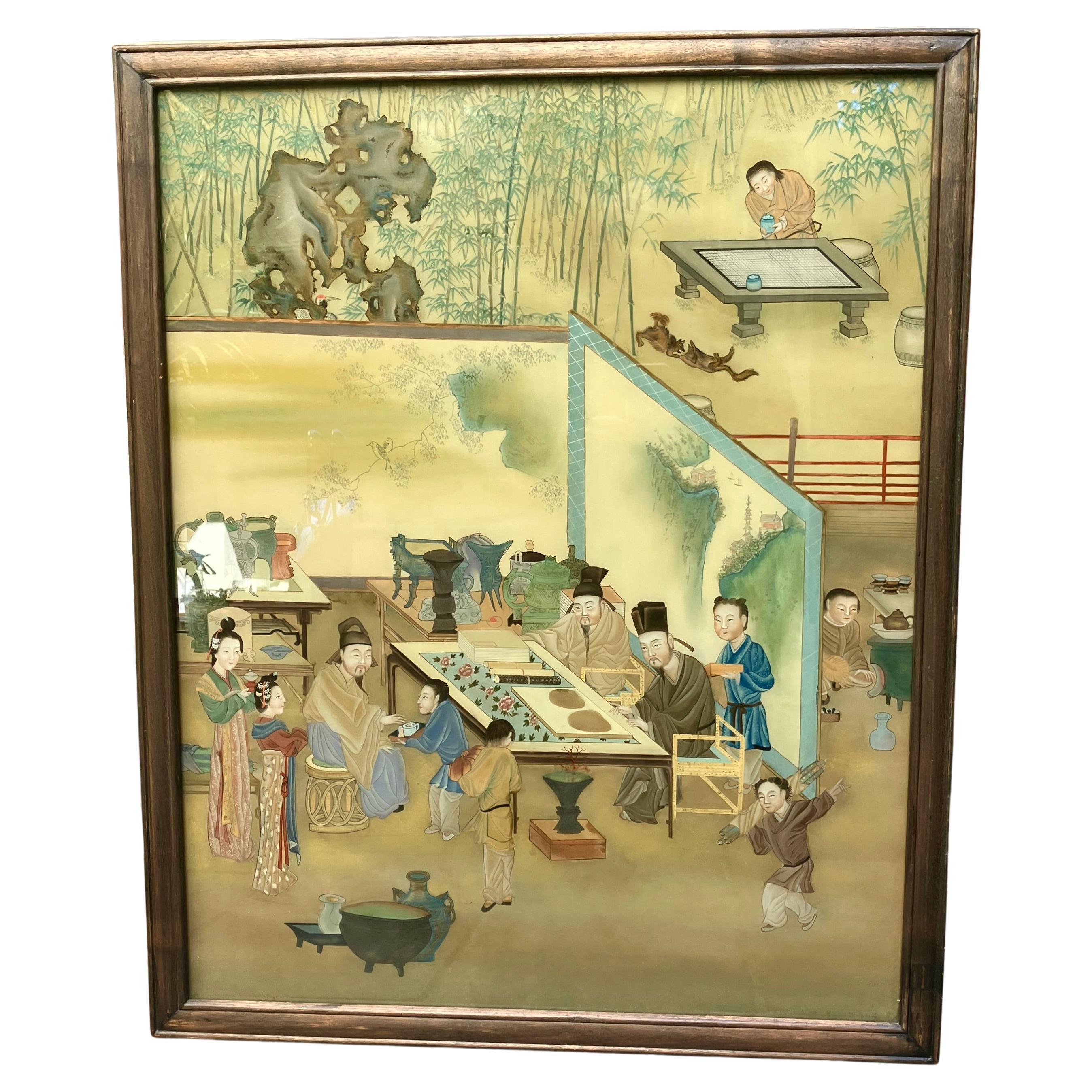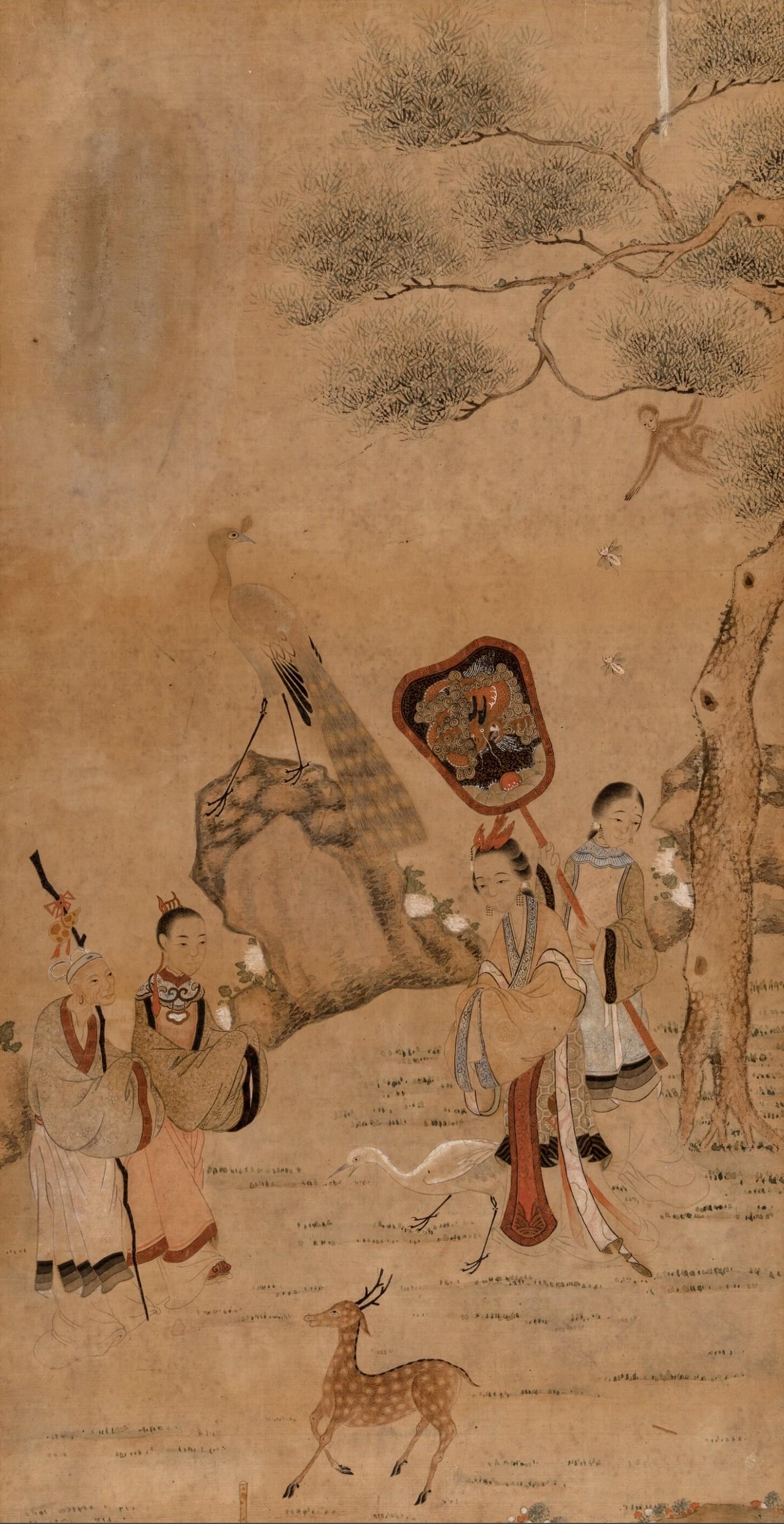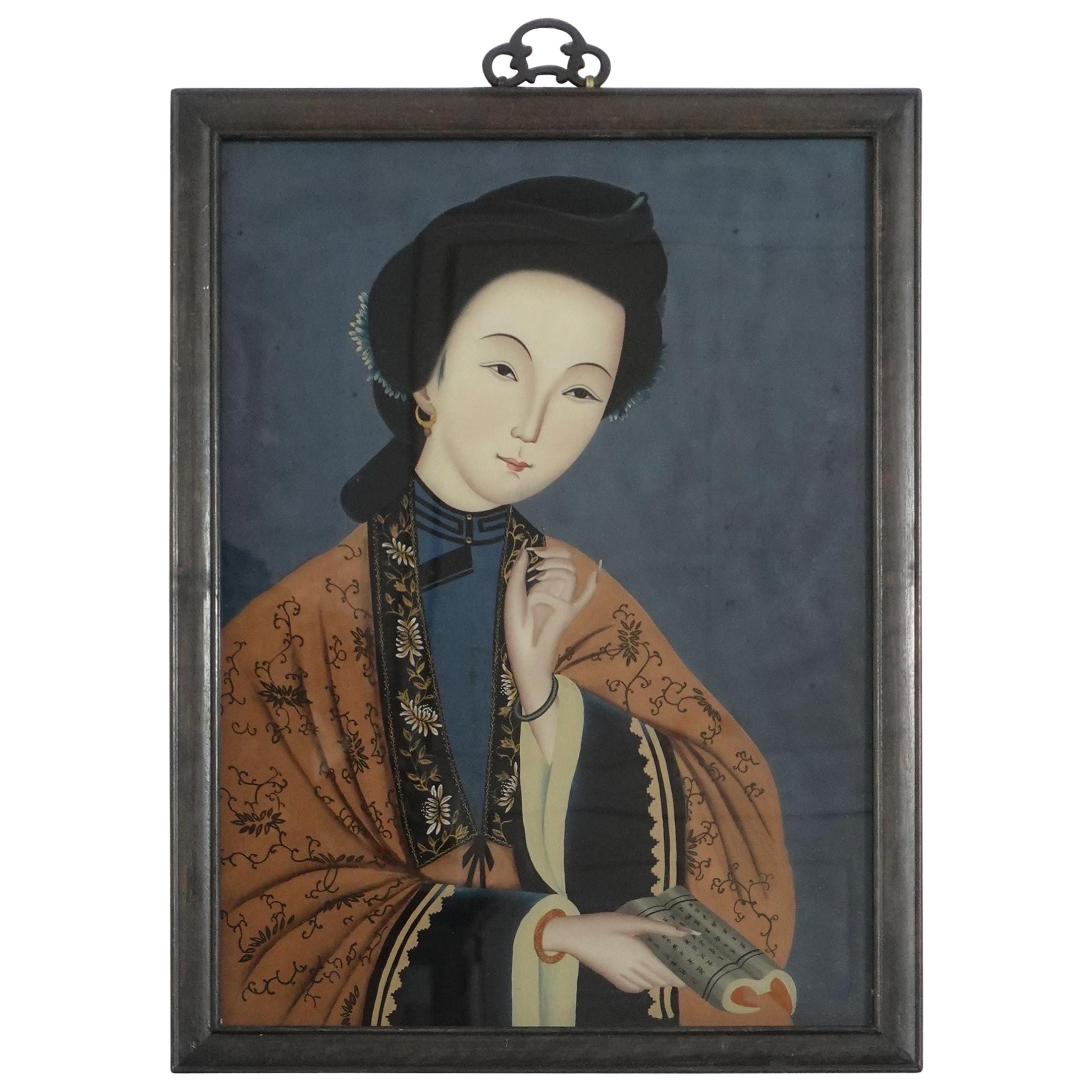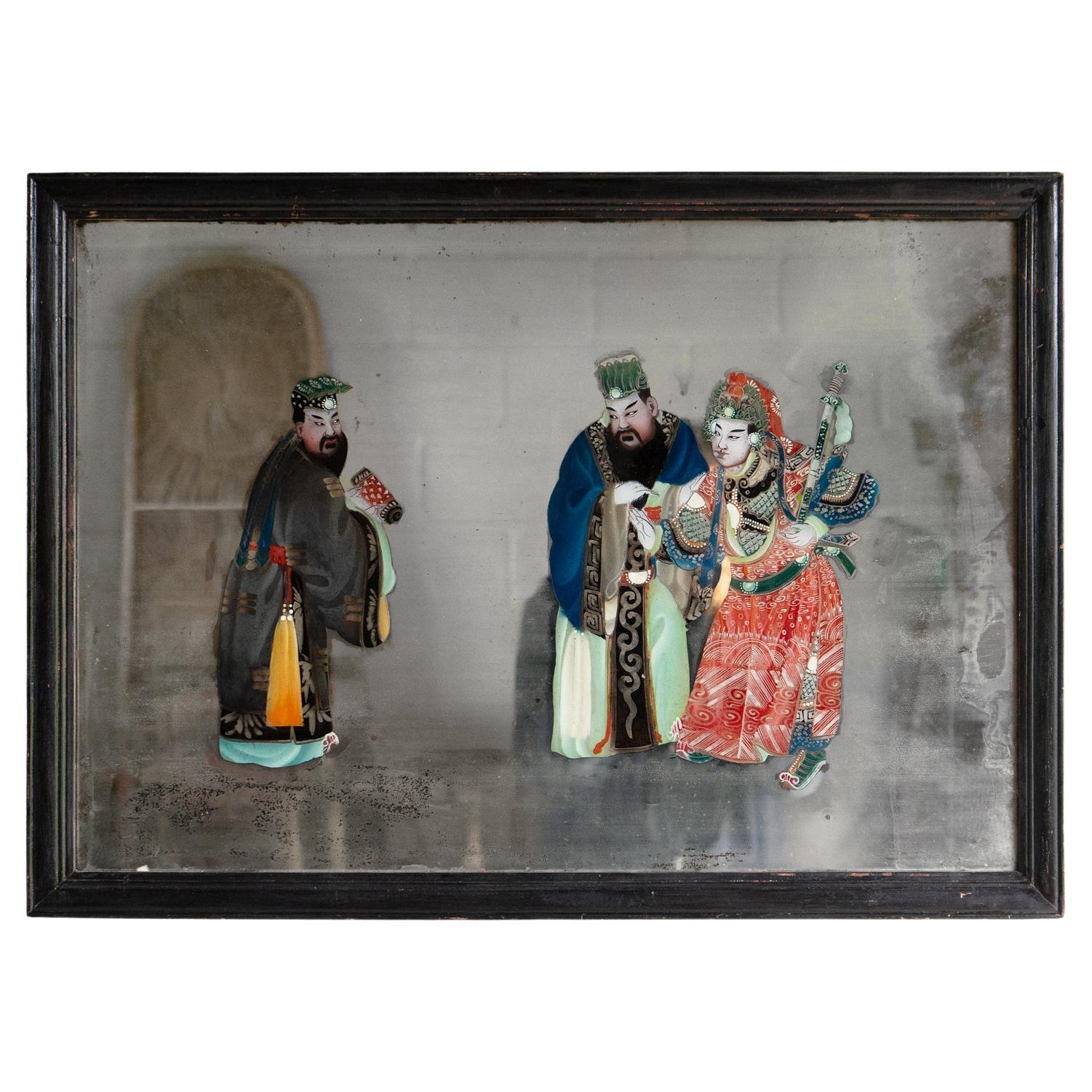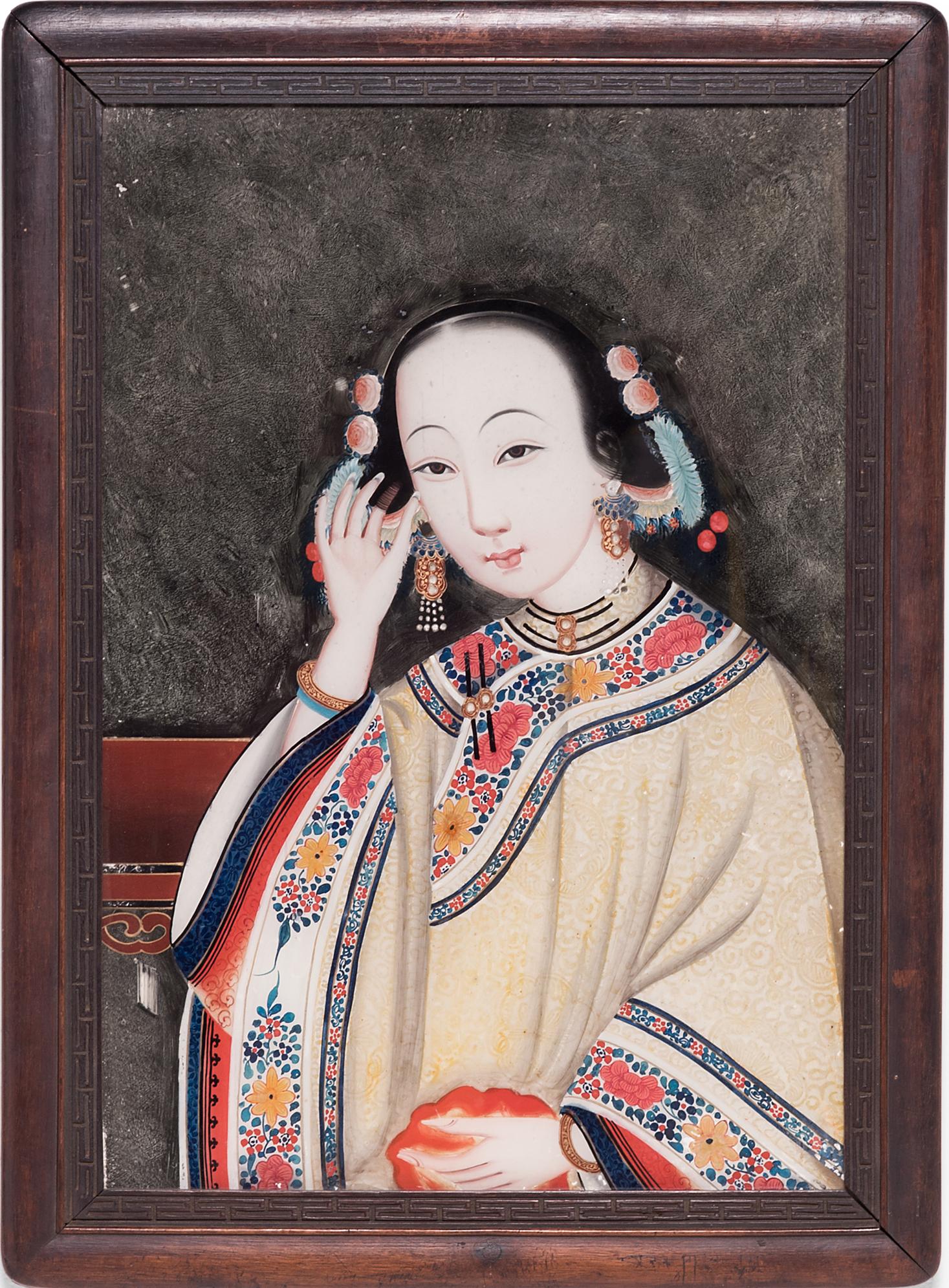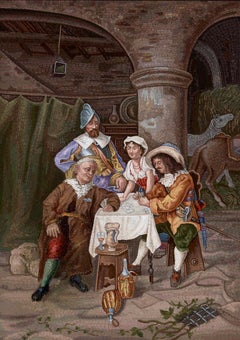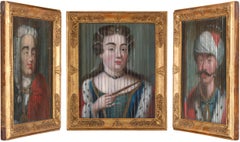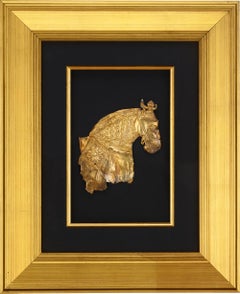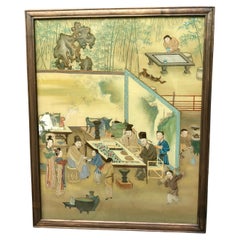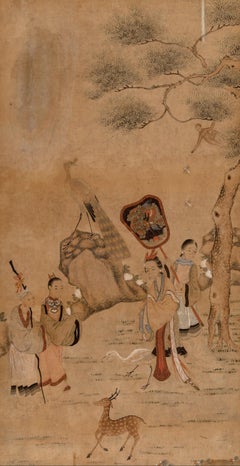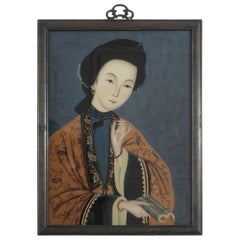Items Similar to Qing Dynasty Chinese Reverse Glass Painting
Want more images or videos?
Request additional images or videos from the seller
1 of 8
UnknownQing Dynasty Chinese Reverse Glass PaintingCirca 1850
Circa 1850
$38,850
£29,720.61
€34,182.13
CA$55,482.75
A$61,157.14
CHF 31,600.31
MX$731,090.41
NOK 397,529.82
SEK 373,621.43
DKK 255,310.42
About the Item
Glass takes the place of canvas in this Qing Dynasty reverse glass painting dating to the 19th century. Chinese painters and calligraphers began the practice of painting in oil on glass in the mid-18th century, and the technique required the utmost skill and precision. Painted layers are applied to the glass in reverse, with the top layer painted first and the background last. Due to the complexity of the process and the high level of artistic skill required, highly detailed examples such as this are only rarely found. Depicting three courtly maidens with a kneeling male figure in an elegant palace setting, it shows a stunning level of detail and retains its vibrant color.
Reverse glass paintings were almost always made for export, as British collectors clamored for all things Chinese during the late 18th and early 19th centuries. In fact, the present scene was once part of the collection of the Lake House, an Elizabethan country house in Wiltshire. It is a typical, though elaborate example of the subjects frequently seen in these works, which often depicted bucolic landscapes populated with Chinese figures enjoying leisurely pursuits. An amazing survival of the luxury trade, this painting is completed by its later giltwood frame.
Inscribed "Lake House" (en verso)
Circa 1850
Glass: 28 1/3" high x 19 1/2" wide
Frame: 34 1/8" high x 25 1/2" wide
- Creation Year:Circa 1850
- Dimensions:Height: 34.13 in (86.7 cm)Width: 25.5 in (64.77 cm)Depth: 1.5 in (3.81 cm)
- Medium:
- Movement & Style:
- Period:
- Condition:
- Gallery Location:New Orleans, LA
- Reference Number:Seller: 31-52301stDibs: LU18610439532
About the Seller
5.0
Vetted Professional Seller
Every seller passes strict standards for authenticity and reliability
Established in 1912
1stDibs seller since 2013
19 sales on 1stDibs
Typical response time: 4 hours
- ShippingRetrieving quote...Shipping from: New Orleans, LA
- Return Policy
Authenticity Guarantee
In the unlikely event there’s an issue with an item’s authenticity, contact us within 1 year for a full refund. DetailsMoney-Back Guarantee
If your item is not as described, is damaged in transit, or does not arrive, contact us within 7 days for a full refund. Details24-Hour Cancellation
You have a 24-hour grace period in which to reconsider your purchase, with no questions asked.Vetted Professional Sellers
Our world-class sellers must adhere to strict standards for service and quality, maintaining the integrity of our listings.Price-Match Guarantee
If you find that a seller listed the same item for a lower price elsewhere, we’ll match it.Trusted Global Delivery
Our best-in-class carrier network provides specialized shipping options worldwide, including custom delivery.More From This Seller
View AllFlorentine Pietre Dure Plaque
Located in New Orleans, LA
Florentine Pietre Dure Plaque
18th Century
A triumph of Florentine craftsmanship, this monumental pietre dure panel stands among the finest surviving examples of its kind. Created i...
Category
18th Century Mixed Media
Materials
Stone, Alabaster, Marble
Gamblers Italian Micromosaic
Located in New Orleans, LA
A friendly game of cards is the subject of this 19th-century Italian micromosaic. A special type of mosaic that uses incredibly small pieces of tesse...
Category
19th Century Other Art Style More Art
Materials
Glass, Mosaic
Tri-Directional Portrait Commemorating the Russo-Turkish War
Located in New Orleans, LA
Austrian School
18th Century
Tri-Directional Portrait Commemorating the Russo-Turkish War
Oil on wooden strips
This extraordinary tri-directional portrait exemplifies the rare innovation known as a triscenorama, capturing a pivotal diplomatic moment through ingenious artistic technique. Employing triangularly cut wooden strips, this remarkable work simultaneously depicts three imperial figures central to the Russo-Turkish War of 1735-1739: Empress Anna Ivanovna Romanova of Russia when viewed directly, Holy Roman Emperor Charles VI from the left and Ottoman Sultan Mahmud I from the right, commemorating the Treaty of Nissa that concluded this significant European conflict.
The portrait utilizes an exceptionally rare optical technique that predates modern movable imaging technology. When observed from different angles, the painted triangular wooden strips create a transformative effect, revealing entirely different imperial portraits as the viewer shifts position. The precision required to execute such a work demonstrates remarkable technical mastery, as the artist had to conceptualize three distinct portraits as well as the meticulous arrangement of the panels. This sophisticated manipulation of perspective creates an interactive viewing experience considered revolutionary for its time.
Almost certainly created by an Austrian artist, this diplomatic artwork likely served as a commemorative piece marking the Treaty of Nissa, signed in September 1739. The treaty concluded Russia's ambitious campaign to secure access to the Black Sea while countering Ottoman raids in Ukraine and the Caucasus regions. Given its exceptional quality and historical significance, this portrait was possibly commissioned by Emperor Charles VI himself, potentially serving as a diplomatic gift to either Empress Anna or Sultan Mahmud I during the treaty negotiations.
Under Empress Anna's leadership, Russia sought to counter devastating raids from Ottoman allies, particularly the Crimean Tatars...
Category
18th Century Old Masters Portrait Paintings
Materials
Wood, Oil, Wood Panel
Gold Tang China Horse Head
Located in New Orleans, LA
This exceptional and rare rendering of a horse head, composed of gold over silver, hails from the illustrious Tang dynasty of China. The powerful Tang dynasty reigned for nearly 300 ...
Category
15th Century and Earlier Other Art Style More Art
Materials
Gold, Silver
German Miniature of Young Lady in a Fancy Hat
Located in New Orleans, LA
This charming German miniature painting, created of oil on copper, depicts a young woman wearing a large and lavish hat. With dark, braided hair and blue eyes, the sitter's cheerful ...
Category
19th Century Old Masters Portrait Paintings
Materials
Copper
Pair of Dragons in Clouds by Prime Minister Morihiro Hosokawa
Located in New Orleans, LA
Prime Minister Morihiro Hosokawa
b. 1938 Japanese
Pair of Dragons in Clouds
Signed, lower left and right
Ink on paper, framed in Jindai cedar
Cra...
Category
21st Century and Contemporary Modern Animal Paintings
Materials
Ink
You May Also Like
Fine Chinese Export Reverse Painting on Glass
Located in San Francisco, CA
A well-executed Chinese export reverse painting on glass depicting an elaborate interior scene with many figures engaged in various domestic activities. This is a finely drawn compos...
Category
Antique Late 19th Century Chinese Chinese Export Paintings and Screens
Materials
Glass, Paint
Antique Chinese School Painting On Silk 19th Century
Located in Forney, TX
A stunning antique Chinese school ink wash painting, 19th century, ink and color on silk, finely detailed, richly decorated, elegantly colored, depicting landscape courtier processio...
Category
Antique 19th Century Asian Qing Paintings and Screens
Materials
Silk
Large Chinese Export Reverse Paintings on Glass, the Beauty
Located in Norton, MA
Large charming 19th-century Chinese export reverse glass painting, depicting the beauty of traditional Chinese customs and clothing decorations on the noblewomen. The paintings come with their original hardwood frame and the old pins...
Category
Antique 19th Century Chinese Paintings and Screens
Materials
Glass, Wood
Antique Chinese Reverse Painting on Glass "Family Gathering" 1920's
Located in Douglas Manor, NY
5000 Antique Chinese Reverse painting on glass et in a period frame with brass hanger
Category
1920s Figurative Paintings
Materials
Oil
$575 Sale Price
54% Off
Large Antique Chinese Export Reverse Painted Mirror, Glass Painting 19th Century
Located in Bristol, GB
ANTIQUE CHINESE REVERSE-PAINTED MIRROR
On a larger-than-average scale, with three figures painted in the central section with a large mirrored background.
The figures are skillful...
Category
Antique 1850s Chinese Qing Paintings and Screens
Materials
Glass, Mirror, Wood, Paint
Chinese Reverse Glass Portrait of a Young Woman
Located in Chicago, IL
With exquisite detail and sparkling color, this portrait of a young woman is a remarkable example of reverse glass painting. Lending the finished work a subtle three-dimensional effe...
Category
Early 20th Century Qing Portrait Paintings
Materials
Glass, Paint
More Ways To Browse
Oil Painting Chinese
Antique Glass Painting
Reverse Painting
19th Century Chinese Painting
Framed Chinese Painting
Mid Century Chinese Landscape Painting
Reverse Glass Painting
19Th Century Reverse Glass Paintings
Chinese Glass Painting
Reverse Glass Art
19th Century Reverse Painting On Glass
19th Century Male Oil Paintings
Chinese Reverse Glass Paintings
Chinese Reverse Painted Glass
Frames Reverse Paint
Reverse Painting On Glass 18th Century
Chinese Dynasty Painting
Chinese Qing Dynasty Paintings
